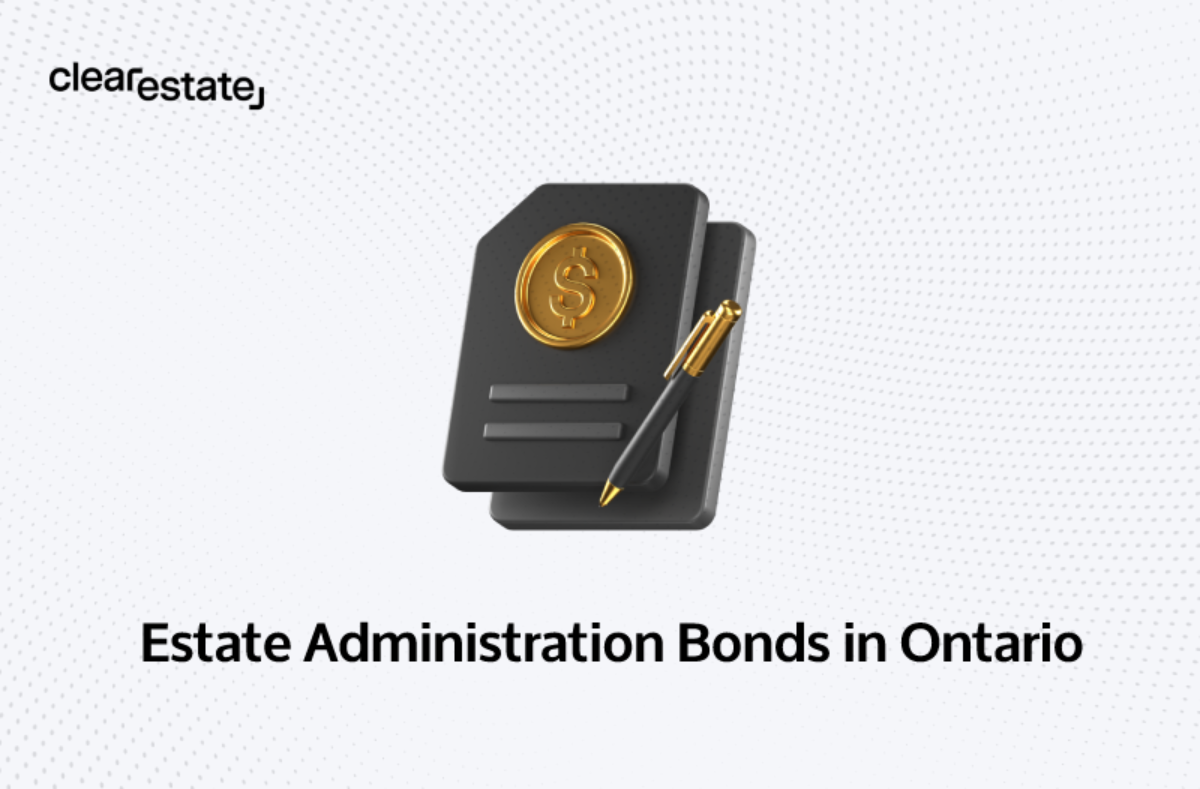Estate Settlement
Dec 04, 2024
How Do Executors Mail Inheritance Checks?
Find out how inheritance checks are mailed, including security measures and what to do if there are delays in receiving them.
Estate administration bonds are a financial surety to estate beneficiaries and creditors, in this blog - we'll provide the essential insights to probate bonds in Ontario.


Estate administration bonds, a form of surety bond, play a vital role in the estate settlement process in Ontario. Issued typically by insurance or bond companies, these bonds act as a safeguard, ensuring that executors conduct their duties ethically and effectively. In case of financial mismanagement or dishonest actions by the executor, the bond provides necessary financial coverage to rectify the situation, thus protecting the interests of the estate's beneficiaries and creditors.
Mandated under Section 35 of Ontario’s Estates Act, obtaining an estate bond requires submitting specific documentation:
The bond not only guarantees the proper management of the estate but also instills confidence among those who stand to inherit, ensuring that their rights and interests are adequately protected.
Estate administration bonds can be necessary in several distinct scenarios within the Ontario probate process, each involving the need to protect the interests of the estate’s beneficiaries.
Some examples include:
By applying for an estate administration bond in these scenarios, executors and administrators can protect both themselves and the beneficiaries of the estate they are managing.
In some cases, it may be decided that an estate is exempt from needing the estate administration bond:
Small Estates: Under Section 36 of Ontario’s Estates Act, administration bonds are typically not required for smaller estates below a certain threshold. This is designed to simplify the probate process for less complex estates, where the bond’s cost is disproportionate to the estate size.
Government Entities as Trustees: When a government entity, such as an office or agency, is appointed to act as the estate’s trustee, the requirement for an estate bond will likely be waived. This is done under the assumption that the government entity will perform the task responsibly and reliably, and that they’re equipped to manage the estate without the extra security that a bond provides.
Sole Beneficiary: A bond may not be required for estates with sole beneficiaries, as they would be managing their own inheritance. However, the final decision can depend on local jurisdictions.
Court Discretion: In some cases, a court may decide to waive the bond requirement, based on the individual estate and the appointed executor.
Surety companies take into account certain factors like credit worthiness, estate complexity, and court discretion, just to name a few - determine how much the probate bond will cost.
Let's breakdown some of the common components of what influences the cost of an estate administration bond:
Estate Value Assessment: The value of the estate plays a pivotal role in calculating the Probate Bond amount. This is to cover any risks associated with the executor's management of the estate.
Creditworthiness Impact: The bondholder's credit history is a crucial factor. For bonds valued under $200,000, the cost can fluctuate between $150 and $1,700, largely influenced by the individual's credit score.
Court's Role in Bond Amount: Courts typically set the bond at approximately double the estate's value, but there's flexibility. Factors like secured assets and absence of debts can lead to a reduced bond amount.
Final Cost Calculation: The cost usually ranges from 0.5% to 1% of the bond's total value. For instance, a bond for a $1,000,000 estate at a 0.75% rate would incur a $7,500 fee, payable as a one-time charge upon issuance of the bond.
Additional Considerations: The size and complexity of the estate also influence the cost. A robust application may lead to a more favorable rate.
Ongoing Fees: It's important to note that surety companies typically charge an annual fee for maintaining the bond. This recurring cost should be factored into the executors financial planning.
When all is said and done, a probate bond will cost around 0.5 - 1% of the total estate value.
In July 2022, laws concerning the process of waiving a bond requirement were updated with Ontario Regulation 435/22. These recent changes made the application process of waiving the bond more complex.
With the update, waiving a bond will involve filing a full motion, and may possibly also require a court hearing. This will give applicants the chance to have their reasons for the waiver reviewed by a judge.
This shift towards a more rigorous procedure reflects an increased emphasis on ensuring that beneficiaries are adequately protected.
An estate administration bond ensures the creditors and beneficiaries of the estate, that the estate is administered responsibly, especially when no will is present or when the estate is complex.
Staying abreast of the latest legal changes, including the nuances of bond requirements, is essential for anyone involved in this process.
Settling an estate, particularly without the requirement of an administration bond, can be a challenging task. At ClearEstate, we specialize in providing expert assistance for seamless estate administration. Our team of experienced professionals is equipped to help you navigate the complexities of estate management, offering solutions that may even allow for the settlement of an estate without the need for a bond.
Contact us today for a free consultation. Let us show you how we can facilitate a smoother, bond-free estate settlement process, providing peace of mind and ensuring compliance with all legal requirements.
 Simplify Probate Today
Simplify Probate Today
Get expert guidance from our probate specialists who've helped 10,000+ families.
Book a free consultation today